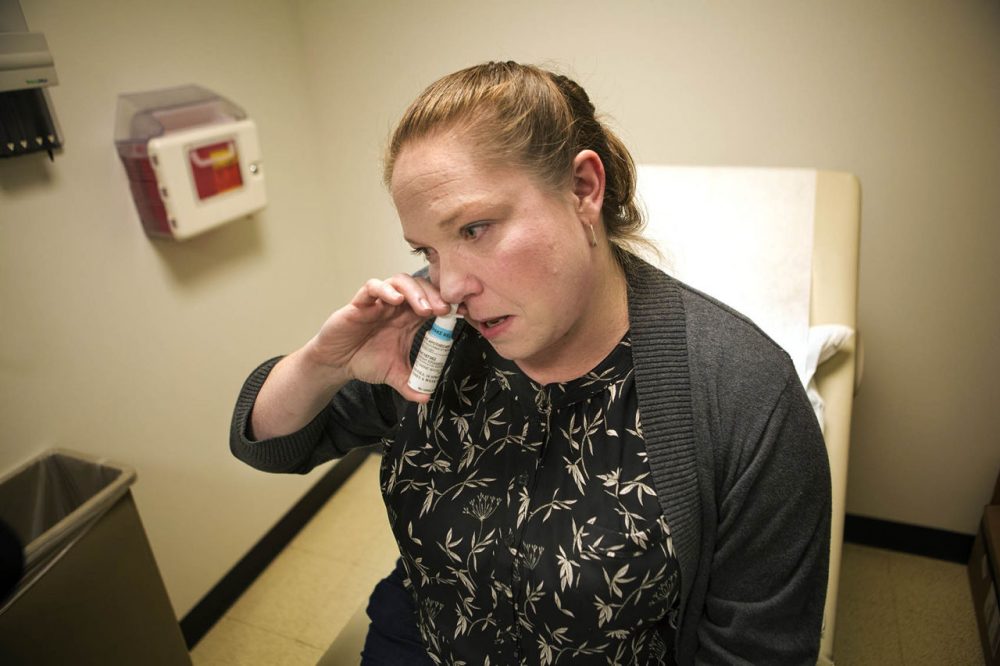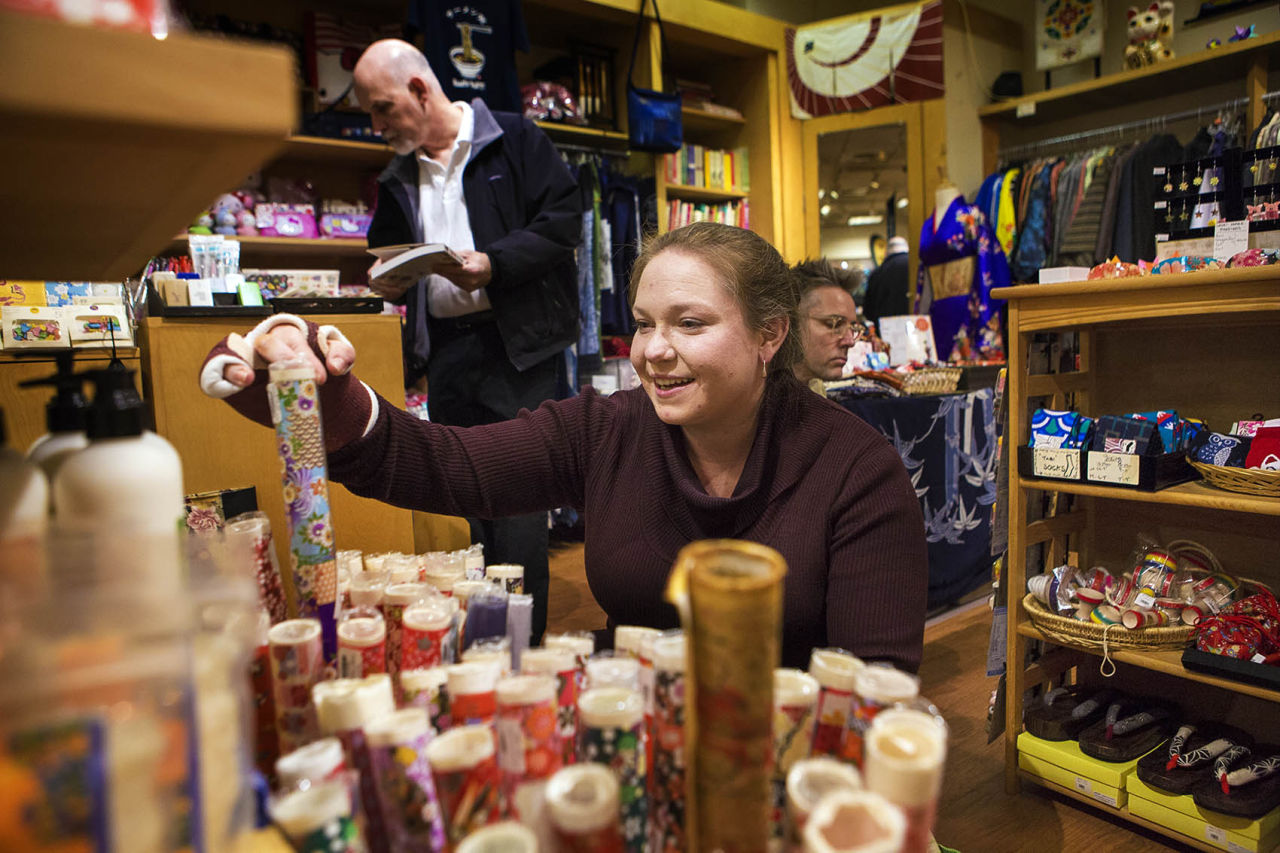Advertisement
‘I Don’t Feel Trapped On Earth’: Ketamine Lifts Many From Depths Of Major Depression

Thirty-seven-year-old Sarah Kramer has been profoundly depressed most of her life. She remembers feeling different from the time she was 4.
"I never wanted to be anything when I grew up, because I didn't want to grow up, because I didn't want to keep living," Kramer, of Medford, recalls.
Kramer grew up a diplomat's daughter. The family moved around Africa, the United States and Canada. She started out a straight-A student, then her grades slipped and she gained weight. She never attempted suicide, but it was always in her thoughts. She had a breakdown in high school and over time ended up on a slew of psychiatric medications.
But she remained depressed and suicidal. In more recent years, she barely left the house.
Now for the first time since Kramer was a child, she has hope. The veil of depression is lifting.
"I feel very much like a stranger in a strange land," she says.
Within A Few Minutes, The Ketamine Kicks In
Kramer is taking a medicine doctors call the biggest discovery in the treatment of mood disorders in decades. It's a drug that was never intended to treat depression. It's used as anesthesia -- and used illegally as a club drug called "Special K."
The drug is ketamine. Kramer takes it as a nasal spray.
We meet Kramer at a Massachusetts General Hospital outpatient clinic where doctors are prescribing ketamine to the most severely depressed patients. Psychiatrist and lead researcher Cristina Cusin says many of the patients are on the verge of suicide. They're people who get little or no relief from traditional antidepressants. But they do get relief from ketamine.
MGH first studied ketamine for major depression in a clinical trial using intravenous infusions of the drug. It's one of several research hospitals doing so, and it's currently recruiting patients for more trials. Janssen Research & Development, a division of Johnson & Johnson, is in late-stage clinical trials of a nasal version of ketamine called esketamine. It plans to apply to the FDA for approval of the medicine for treatment-resistant depression in 2019, according to a company spokesman.
Advertisement
Lots of small, private ketamine clinics are popping up around the country, as well; some are administering intravenous ketamine as treatment for obsessive compulsive disorder, anxiety and bipolar disorder, in addition to major depression. There's a clinic in Newburyport and another in Lexington. All ketamine treatment for mental illness is, at this point, experimental.
![During the first administration [of intranasal ketamine] we take vitals every 10 minutes,](https://media.wbur.org/wp/2016/02/1117_ketamine-therapy03.jpg)
Kramer was part of the first MGH trial with ketamine infusions. Now she takes the nasal ketamine at home. But on this day, she's taking it at the clinic to show us how it works and that it does, indeed, work. Kramer leans back on the exam table and tilts her head so the ketamine trickles into her nasal passages. She puts on headphones and turns on some music that helps her relax.
Within about three minutes, the ketamine kicks in. It makes Kramer feel kind of loopy. The drug has psychoactive effects that leave patients high or out-of-sorts for about an hour.
"OK, I'm starting to get a little woozy," Kramer says. "A lot of people report out-of-body experiences with ketamine. And I have not experienced that. But I have experienced elation. There are definitely aural effects. I hear almost reverb a little bit."
She does a little mental exercise, counting forward and backward out loud, to try to meditate.
Drastic Results, But Unknown Long-Term Side Effects
Kramer and the 30 other patients at the MGH ketamine clinic had to sign consent forms acknowledging the risk of long-term side effects.
"Nobody knows the repeated use of [a] very small dose of ketamine, what that will do to the brain. We don't know yet," researcher Cusin says. "[The patients] all say to us, 'I don't care if it's going to cause some side effect down the line. I don't feel like killing myself tomorrow, and this is what matters for me.' "
In MGH's clinical trial, intravenous ketamine alleviated depression in about half of participants. Some other studies with different patient criteria have had success rates as high as 75 percent.
Cusin says patients in the MGH trial saw their moods change quickly and drastically. They came in with deep emotional pain that was unrelenting, and they saw it melt away.
"They just say, 'I don't feel like I felt two hours ago. I don't know why.' They just wanted to go out and enjoy the spring or to look at the sky, and the colors were brighter and just life had meaning again," Cusin recalls. "I was very surprised!" she says of her reaction. "I've never seen this."
She's never seen such a dramatic and fast improvement in someone with such severe depression. Traditional antidepressants can take four to six weeks to work — if they work. The effect of the ketamine taken intravenously lasts several days, and for some patients several weeks. The nasal spray is less effective but more practical for outpatients.
Research has found ketamine acts on the neurotransmitter glutamate — and sparks growth of new connections among brain cells.
Planning For An Unexpected Future
Sarah Kramer's depression doesn't disappear with the ketamine. It does relent.
But now, she's having to wrestle with a whole new set of emotions because she never imagined a future without depression — or planned for it.
"It's almost overwhelming, like, 'Oh God, what do I do now that that thing that was, you know, the defining factor in my life — it's not gone, it's still there. It's my history. It's my identity in a lot of ways. But it's not holding me back today," she says, beginning to choke up. "I'm so thankful, and that's all. It's complicated in a few ways, because now I feel like I have this burden, like I have to figure out the rest of my life if I'm going to have one!"
Ketamine is not a cure for depression. Doctors emphasize that.
And one drawback is that the longer Kramer takes it, the larger the dose she needs to get the same relief. That's known as "habituation."
Kramer's husband Dave, who has a different last name but doesn't want to use it because of medical privacy reasons, has concerns about ketamine. He worries that people with depression may abuse the drug because of its mind-altering effects. But, he says, it's better than the mega-doses of psychiatric drugs his wife has been taking for years.
"It's helped keep her on slightly more of an upward level, out of the depression," he says. "And we've been able to do more things, and I've been able to get her to go outside and be social with people, and do all the normal human things I've been trying to get her to do."
Even going out to brunch together was a victory for them.

A few weeks after we met Kramer at the clinic, we catch up with her doing something else that before ketamine was overwhelming. She's shopping at a mall in Cambridge, in her favorite shop for art supplies, the Japanese store Tokai.
Kramer has brought along a small gift box she covered in turquoise paper. It holds eight ornate glass fridge magnets lined with pretty bits of mulberry paper. She made them, and she's going to ask the store manager if he’d like to sell them at the shop. That's another huge step for her. He’s not in, and she says she’ll come back later.
When we ask her how she's feeling today with the help of the ketamine, she says it's tough to answer.
"Right now, thanks to ketamine, I can really tell you better what I don't feel," she reflects. "I don't feel despair. I don't feel hopeless. I don't feel trapped on earth."

